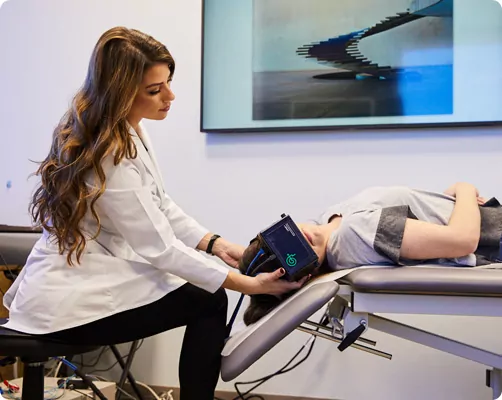How Vertigo Medicine May Increase Everyday Life
How Vertigo Medicine May Increase Everyday Life
Blog Article
Vertigo is a frequent condition that affects huge numbers of people worldwide. It is characterized by way of a sensation of dizziness, spinning, or emotion off-balance. While vertigo could be brought on by different factors, distinguishing the underlying trigger is a must in determining the most truly effective therapy plan. In this blog post, we will examine why it is essential to recognize the what causes vertigo powerful treatment and how it may improve your overall quality of life.

Vertigo could be caused by many facets such as for instance inner head issues, head accidents, headaches, and actually particular medications. Without understanding the basis reason behind your vertigo signs, it could be complicated to find a suitable treatment that may give long-term relief. For instance, if your vertigo is brought on by an inner ear issue but you are given medication for headaches alternatively, you may not knowledge any development in your symptoms.
Distinguishing the explanation for vertigo requires a complete evaluation from the medical professional. This could contain physical exams and diagnostic checks such as for instance blood function and imaging scans to exclude any main situations or injuries that might be causing your symptoms. When the cause has been decided, a personalized treatment approach could be made to deal with your certain needs.
One reason why distinguishing the reason for vertigo is important for successful therapy is basically because different triggers require different approaches in handling symptoms. As an example, if your vertigo is due to an inner ear problem named benign paroxysmal positional vertigo (BPPV), particular exercises known as canalith repositioning maneuvers will help alleviate symptoms. Nevertheless, these exercises would not be useful if your vertigo was due to another thing like vestibular neuritis.
Moreover, treating only the outward symptoms without addressing their root cause can result in short-term aid but not long-term development in overall health and well-being. As an example, getting medication to alleviate vertigo indicators due to an interior head problem may offer temporary comfort, but it generally does not handle the underlying issue. This can result in recurring attacks of vertigo and a diminished quality of life.
Distinguishing the cause of vertigo can also be critical in avoiding potential periods and handling any possible complications. Like, if your vertigo is caused by a mind damage, pinpointing it in early stages may reduce further damage and allow for proper therapy to be administered promptly.

Realization: To conclude, identifying the reason for your vertigo is needed for efficient therapy and over all well-being. It permits a individualized strategy that handles the main trigger somewhat than simply treating symptoms. With proper analysis and therapy, you can knowledge long-term relief from your signs and boost your standard of living significantly. If you are experiencing repeated attacks of vertigo or other connected symptoms, don't wait to find medical attention to ascertain the underlying cause and obtain ideal treatment.
________________________________________
Top Medicines Recommended for Vertigo Aid: What Operates and Why
===============================================
Vertigo is a frequent issue that influences thousands of people worldwide. It's characterized by way of a experience of dizziness, spinning, and loss in balance. While there are various triggers for vertigo, it can be debilitating and greatly impact one's quality of life. Fortuitously, you can find medicines accessible to simply help reduce the outward symptoms and provide reduction for those experiencing vertigo. In that blog post, we shall discuss the different types of medicine for dizziness reduction and why they work.

Probably the most commonly recommended treatment for vertigo is called Meclizine (Antivert). This treatment belongs to a class referred to as antihistamines which work by blocking histamine receptors in the mind responsible for causing dizziness and nausea. Meclizine has been found to be effective in reducing symptoms such as dizziness, sickness, and nausea connected with vertigo. It's generally taken 1-4 instances daily with regards to the severity of symptoms.
Another type of medicine used to deal with vertigo is named Benzodiazepines (Valium or Ativan). These drugs act on certain neurotransmitters in the brain that control stability and coordination. They've been found to work in reducing feelings of dizziness and panic connected with vertigo. But, these drugs can cause drowsiness
as a side effect therefore they must be used with caution.
In some cases wherever other drugs have not offered relief or if there are underlying conditions creating vertigo such as for example Meniere's infection or vestibular headaches, doctors may possibly prescribe diuretics like hydrochlorothiazide (HCTZ) or acetazolamide (Diamox). These drugs function by reducing liquid accumulation in the inner ear which could contribute to periods of vertigo.
For people who experience significant bouts of vertigo that do perhaps not respond properly to different medications, health practitioners might prescribe steroids such as for instance prednisone. These drugs work by reducing inflammation in the internal head that may trigger vertigo. However, they're frequently prescribed for short-term use due to possible area effects.
As well as these medications, medical practioners may also suggest vestibular rehabilitation treatment (VRT) for long-term rest from vertigo symptoms. VRT is a questionnaire of bodily therapy that centers on exercises and practices to boost balance and reduce dizziness. It's been discovered to work in managing vertigo indicators and improving over all quality of life.

Conclusion: While there's no one-size-fits-all strategy when it comes to treating vertigo, drugs can offer substantial comfort for anyone suffering from this condition. Meclizine, Benzodiazepines, diuretics, steroids, and VRT are all frequently prescribed possibilities that have been discovered to work in controlling vertigo symptoms. It is important to consult with a doctor before beginning any medication regime as they are able to establish the very best span of therapy predicated on specific needs and medical history. Report this page